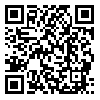Volume 4, Issue 1 (5-2020)
JSBCH 2020, 4(1): 487-496 |
Back to browse issues page
1- Faculty of Education & Psychology, Kharazmi University, Tehran, Iran. , kian@khu.ac.ir
2- Faculty of Education & Psychology, Kharazmi University, Tehran, Iran.
2- Faculty of Education & Psychology, Kharazmi University, Tehran, Iran.
Abstract: (2121 Views)
Background: Hidden curriculum in every school may have different side effects on students. The purpose of this study was to investigate the relations of hidden curriculum with creativity and social skills among elementary students.
Methods: The research method was descriptive-correlational. The study population consisted of all sixth-grade elementary students in Roodsar, Gilan (including 616 students) in the academic year 2018-2019. According to Morgan and Krejcie's Table, the sample size was 270 students, which were selected by simple random sampling. The research tools included Taghipoor and Ghafari's Hidden Curriculum Questionnaire, Torrance's Creative Thinking Form B, and Matson's Social Skills Questionnaire. The validity and the reliability of the questionnaires were obtained, using Alpha Cronbach Coefficient and were 0.91, 0.90, and 0.86, respectively. Regression and path analysis were done for data analysis using SPSS 24.
Results: The findings showed that hidden curriculum has a strong positive and significant relation with creativity in terms of school social climate. Also, the hidden curriculum had a strong positive and significant relation with the components of appropriate social skills, non-social behaviors, aggression, and supremacy. In addition, there was no significant relation between creativity and social skills. Moreover, the results of the path analysis showed that hidden curriculum has a positive and significant relation with the four components of social skills and finally. In addition, hidden curriculum had a significant relation with the students’ creativity.
Conclusion: Generally, it can be concluded that hidden curriculum plays an important role through the implicit transfer of values, attitudes, and skills to students, especially on social skills and creativity, so that these issues need to be given more attention by the educators in every educational setting.
Methods: The research method was descriptive-correlational. The study population consisted of all sixth-grade elementary students in Roodsar, Gilan (including 616 students) in the academic year 2018-2019. According to Morgan and Krejcie's Table, the sample size was 270 students, which were selected by simple random sampling. The research tools included Taghipoor and Ghafari's Hidden Curriculum Questionnaire, Torrance's Creative Thinking Form B, and Matson's Social Skills Questionnaire. The validity and the reliability of the questionnaires were obtained, using Alpha Cronbach Coefficient and were 0.91, 0.90, and 0.86, respectively. Regression and path analysis were done for data analysis using SPSS 24.
Results: The findings showed that hidden curriculum has a strong positive and significant relation with creativity in terms of school social climate. Also, the hidden curriculum had a strong positive and significant relation with the components of appropriate social skills, non-social behaviors, aggression, and supremacy. In addition, there was no significant relation between creativity and social skills. Moreover, the results of the path analysis showed that hidden curriculum has a positive and significant relation with the four components of social skills and finally. In addition, hidden curriculum had a significant relation with the students’ creativity.
Conclusion: Generally, it can be concluded that hidden curriculum plays an important role through the implicit transfer of values, attitudes, and skills to students, especially on social skills and creativity, so that these issues need to be given more attention by the educators in every educational setting.
Type of Study: Original Article |
Subject:
Education & Health
Received: 2019/12/16 | Accepted: 2020/05/5 | Published: 2020/05/26
Received: 2019/12/16 | Accepted: 2020/05/5 | Published: 2020/05/26
| Rights and permissions | |
 |
This work is licensed under a Creative Commons Attribution-NonCommercial 4.0 International License. |





